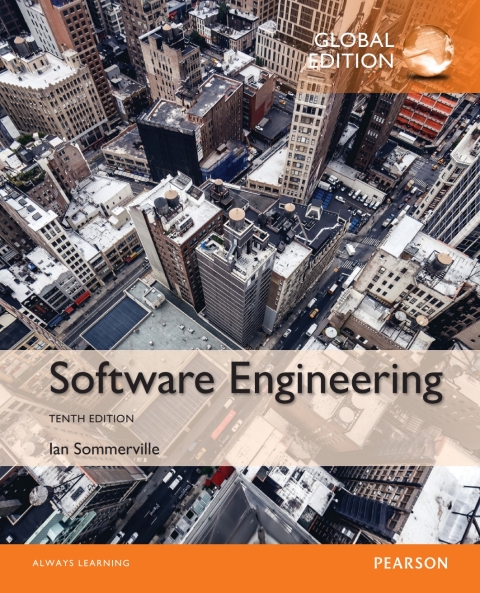Description
Efnisyfirlit
- Title Page
- Copyright Page
- Preface
- Acknowledgements
- Contents at a glance
- Dedication
- Contents
- Part 1 Introduction to Software Engineering
- Chapter 1 Introduction
- 1.1 Professional software development
- 1.2 Software engineering ethics
- 1.3 Case studies
- Chapter 2 Software processes
- 2.1 Software process models
- 2.2 Process activities
- 2.3 Coping with change
- 2.4 Process improvement
- Chapter 3 Agile software development
- 3.1 Agile methods
- 3.2 Agile development techniques
- 3.3 Agile project management
- 3.4 Scaling agile methods
- Chapter 4 Requirements engineering
- 4.1 Functional and non-functional requirements
- 4.2 Requirements engineering processes
- 4.3 Requirements elicitation
- 4.4 Requirements specification
- 4.5 Requirements validation
- 4.6 Requirements change
- Chapter 5 System modeling
- 5.1 Context models
- 5.2 Interaction models
- 5.3 Structural models
- 5.4 Behavioral models
- 5.5 Model-driven architecture
- Chapter 6 Architectural design
- 6.1 Architectural design decisions
- 6.2 Architectural views
- 6.3 Architectural patterns
- 6.4 Application architectures
- Chapter 7 Design and implementation
- 7.1 Object-oriented design using the UML
- 7.2 Design patterns
- 7.3 Implementation issues
- 7.4 Open-source development
- Chapter 8 Software testing
- 8.1 Development testing
- 8.2 Test-driven development
- 8.3 Release testing
- 8.4 User testing
- Chapter 9 Software evolution
- 9.1 Evolution processes
- 9.2 Legacy systems
- 9.3 Software maintenance
- Part 2 System Dependability and Security
- Chapter 10 Dependable systems
- 10.1 Dependability properties
- 10.2 Sociotechnical systems
- 10.3 Redundancy and diversity
- 10.4 Dependable processes
- 10.5 Formal methods and dependability
- Chapter 11 Reliability engineering
- 11.1 Availability and reliability
- 11.2 Reliability requirements
- 11.3 Fault-tolerant architectures
- 11.4 Programming for reliability
- 11.5 Reliability measurement
- Chapter 12 Safety engineering
- 12.1 Safety-critical systems
- 12.2 Safety requirements
- 12.3 Safety engineering processes
- 12.4 Safety cases
- Chapter 13 Security engineering
- 13.1 Security and dependability
- 13.2 Security and organizations
- 13.3 Security requirements
- 13.4 Secure systems design
- 13.5 Security testing and assurance
- Chapter 14 Resilience engineering
- 14.1 Cybersecurity
- 14.2 Sociotechnical resilience
- 14.3 Resilient systems design
- Part 3 Advanced Software Engineering
- Chapter 15 Software reuse
- 15.1 The reuse landscape
- 15.2 Application frameworks
- 15.3 Software product lines
- 15.4 Application system reuse
- Chapter 16 Component-based software engineering
- 16.1 Components and component models
- 16.2 CBSE processes
- 16.3 Component composition
- Chapter 17 Distributed software engineering
- 17.1 Distributed systems
- 17.2 Client–server computing
- 17.3 Architectural patterns for distributed systems
- 17.4 Software as a service
- Chapter 18 Service-oriented software engineering
- 18.1 Service-oriented architecture
- 18.2 RESTful services
- 18.3 Service engineering
- 18.4 Service composition
- Chapter 19 Systems engineering
- 19.1 Sociotechnical systems
- 19.2 Conceptual design
- 19.3 System procurement
- 19.4 System development
- 19.5 System operation and evolution
- Chapter 20 Systems of systems
- 20.1 System complexity
- 20.2 Systems of systems classification
- 20.3 Reductionism and complex systems
- 20.4 Systems of systems engineering
- 20.5 Systems of systems architecture
- Chapter 21 Real-time software engineering
- 21.1 Embedded system design
- 21.2 Architectural patterns for real-time software
- 21.3 Timing analysis
- 21.4 Real-time operating systems
- Part 4 Software Management
- Chapter 22 Project management
- 22.1 Risk management
- 22.2 Managing people
- 22.3 Teamwork
- Chapter 23 Project planning
- 23.1 Software pricing
- 23.2 Plan-driven development
- 23.3 Project scheduling
- 23.4 Agile planning
- 23.5 Estimation techniques
- 23.6 COCOMO cost modeling
- Chapter 24 Quality management
- 24.1 Software quality
- 24.2 Software standards
- 24.3 Reviews and inspections
- 24.4 Quality management and agile development
- 24.5 Software measurement
- Chapter 25 Configuration management
- 25.1 Version management
- 25.2 System building
- 25.3 Change management
- 25.4 Release management
- Glossary
- A
- B
- C
- D
- E
- F
- G
- H
- I
- J
- L
- M
- N
- O
- P
- Q
- R
- S
- T
- U
- V
- W
- X
- Z
- Subject index
- A
- B
- C
- D
- E
- F
- G
- H
- I
- J
- L
- M
- N
- O
- P
- Q
- R
- S
- T
- U
- V
- W
- X
- Author index
- A
- B
- C
- D
- E
- F
- G
- H
- I
- J
- K
- L
- M
- N
- O
- P
- Q
- R
- S
- T
- U
- V
- W
- X
- Y
- Z







Reviews
There are no reviews yet.